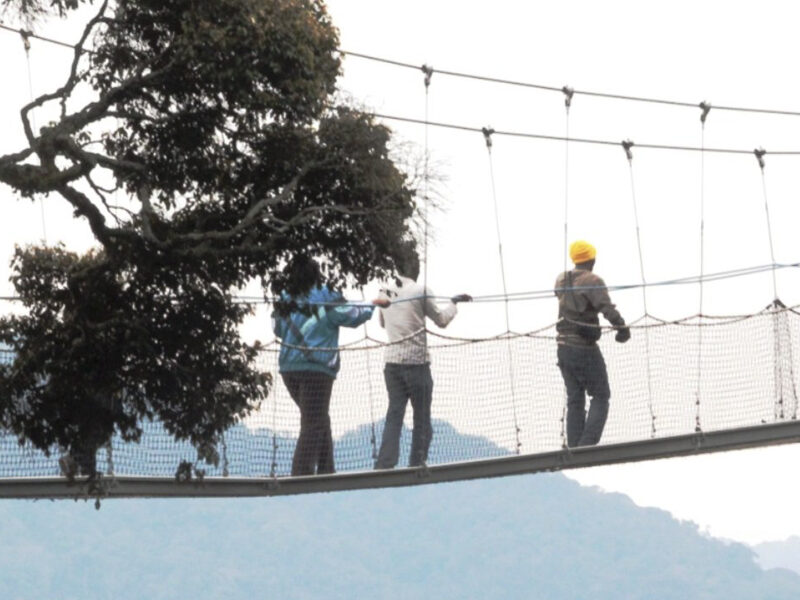15 Days Uganda Cultural Experience
5000$
per personOn this tour, you will see Nakayima tree shrine, Omukama’s Royal Palace in Tooro, the hotsprings and crater lakes in Fort Portal, staragmites and staractites in Kibale, game, birds and chimps in Queen Elizabeth park, Buhoma village walk and gorillas in Bwindi, game and launch cruise on Lake Mburo, the batwa pygmies, before returning to Kampala for the Kabaka’s Trail and a visit to the Source of the River Nile.
Travelers joining this trip have an opportunity to see various cultures in Uganda (Click here for the Rwanda experience). The Uganda safari starts with Kibale Forest National Park in the West. En route, see the Nakayima tree in Mubende, a local tree about 400 years old, venerated in local folklore as holding the spirit of an ancient king. See local projects and abundant game in Queen Elizabeth Parkincluding buffaloes, tree-climbing lions, leopards, warthogs and the ever present hippos.
The beautiful steeply forested Kyambura Gorge, is home not only to chimpanzees man’s closest relation – but also the red-tailed monkey, black and white colobus and many bird species. Around Ishasha go on the hunt for the famous tree-climbing lions which lounge nonchalantly on old fig trees. Further south in Bwindi see local communities and projects (gorilla tracking can be arranged as well) before continuing to Mgahinga. Visit the local Batwa animist communities. Return to Kampala via Lake Mburo, one of Uganda’s most striking parks rich in birds, hippo, buffalo, zebra and cultural communities.
Back in Kampala trail Kabaka’s Trail; see the cultures of Buganda and see the preserved lifestyle of their ancient kings. See Naggalabi Kings’ Crown-ground, Kasubi Royal Tombs, Katereke Royal Prison, King Wamala’s tombs and other cultural visits organised by Heritage Trails Local Project. Namugongo Martyrs’ shrine, East of Kampala City where some 22 staunch Catholics were burnt alive in the 19th century is also worth visiting.
Visit Bahai Temple, the only one in Africa; buy art crafts. In the East, at Jinja, look at Sezibwa local Falls and the Source of the Nile. Visitors stay in selected homes or lodges of local people who take care of your food, drink and accommodation.
For those who wish, a visit for an extra three days by air, to the Karamajong nomadic farmers/cattle rustlers in the North, can be arranged. Please contact us for details.
-
DepartureTour startTour starts from: “Entebbe” at 10:00 a.m. every Saturdays from: Kampala, Entebbe, Uganda
-
Departure TimePlease arrive by 9:15 AM for a prompt departure at 9:30 AM.
-
Return TimeApproximately 8:30 PM.
-
Dress CodeCasual. Comfortable athletic clothing, hiking shoes, hat, light jacket.
-
Include
Day 1: Arrival
Day 2: Kampala to Fort Portal
Day 3: The Royal Palace in Fort Portal
Day 4: Queen Elizabeth Park
Day 5: Queen Elizabeth Park
Day 6: Queen Elizabeth Park
Day 7: Queen Elizabeth Park to Bwindi
Day 8: Buhoma Village Tourist Walk
Day 9: The dramatic virunga volcanoes
Day 10: The Batwa pigmies
Day 11: Mgahing to Lake Mburo Park
Day 12: Kampala the Capital
Day 13: Kampala the Capital
Day 14: Jinja and Source of the River Nile
Day 15: Departure
Tour Location
On this tour, you will see Nakayima tree shrine, Omukama’s Royal Palace in Tooro, the hotsprings and crater lakes in Fort Portal, staragmites and staractites in Kibale, game, birds and chimps in Queen Elizabeth park, Buhoma village walk and gorillas in Bwindi, game and launch cruise on Lake Mburo, the batwa pygmies, before returning to Kampala for the Kabaka’s Trail and a visit to the Source of the River Nile.
-
Uganda's history is marked by pre-colonial kingdoms, British colonial rule, and post-independence challenges. The country's borders were drawn arbitrarily in the late 19th century, encompassing diverse societies. In 1894, Uganda became a British protectorate, and it gained independence on October 9, 1962. Following independence, Uganda faced a period of political instability, including civil wars and military coups.Pre-Colonial Period:
- Uganda's early history is characterized by the movement of various groups of cultivators and herders, leading to diverse languages and cultures.
- The region was home to a variety of centralized kingdoms, including Buganda, Bunyoro, and others, as well as more decentralized Nilotic and Sudanic peoples.
- Evidence of human activity in Uganda dates back to at least 50,000 years ago, with Acheulean tools found along the Kagera River valley.
British Colonial Period (1894-1962):- In 1894, Uganda was declared a British protectorate.
- The British administration extended control beyond Buganda by signing treaties with other kingdoms like Toro, Ankole, and Bunyoro.
- Uganda was never fully colonized; instead, it developed a system of internal self-government through a Legislative and Executive Council.
- The British influence was strong in the late 19th century, particularly with the arrival of missionaries from the British Missionary Society and the French Roman Catholic White Fathers.
Independence and Post-Colonial Period (1962-Present):- Uganda gained independence on October 9, 1962, with Milton Obote as the first Prime Minister.
- The newly independent nation faced challenges, including civil wars and political instability, leading to a period of military coups and dictatorships.
- In 1995, a new constitution was adopted, establishing a non-party all-inclusive Movement System of government.
- In 2005, a referendum was held, resulting in a return to multi-party politics.
- Uganda has since made significant strides in restoring peace and rebuilding infrastructure, while also engaging in peacekeeping operations through the Uganda People's Defence Force.
Key Events and Figures:- Milton Obote: The first Prime Minister of Uganda, who played a key role in the independence movement and later served as President.
- Idi Amin: A military leader who seized power in 1971 and ruled Uganda for eight years, a period marked by human rights abuses and political instability.
- Yoweri Museveni: The current President of Uganda, who has been in power since 1986.
- Uganda's early history is characterized by the movement of various groups of cultivators and herders, leading to diverse languages and cultures.
Write a Review
Choice of traditional friendly hotels and lodges with a taste of local dishes










